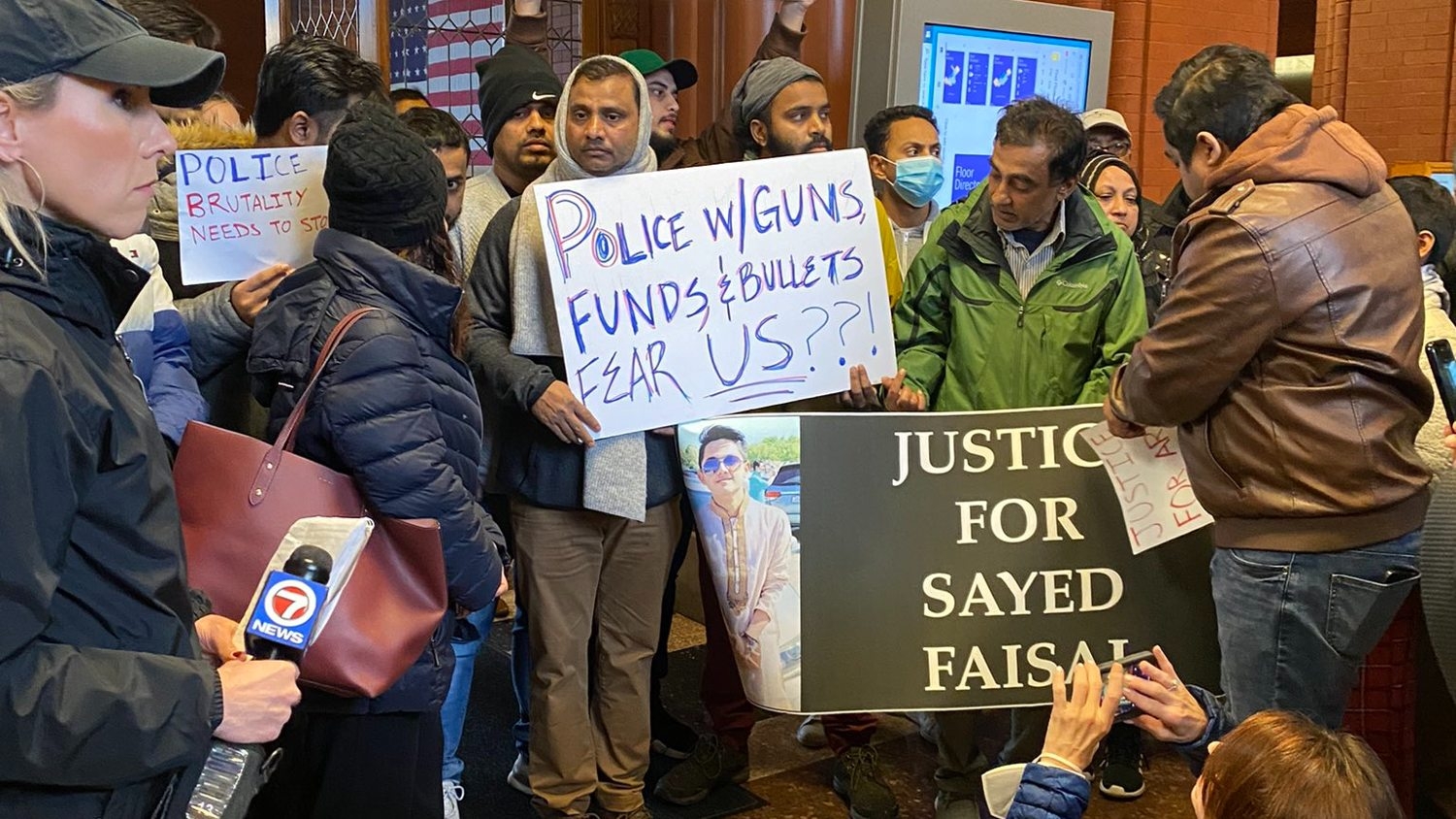US Muslim community demands justice over police killing of Bangladeshi man

Local rights groups and the family and friends of a young Bangladeshi man killed last week in a police shooting in Cambridge, Massachusetts, demanded justice, transparency and accountability during a protest on Monday.
The protest was the second to take place in a week over the killing, which has led to calls for an end to the Cambridge police's involvement in mental health-related emergencies.
'The community demands justice and real change so this never happens again. Everyone in crisis deserves to be met with support and care, not violence'
- Fatema Ahmad, Muslim Justice League
An attorney for the local district said that on Wednesday 4 January police officers responded to a call from a resident who reported seeing a person jump out of the window of a neighbouring apartment. The resident said he saw a man cutting himself with broken window glass and a knife.
The district attorney said the preliminary investigation suggested that 20-year-old Arif Sayed Faisal reportedly ran away with a machete-like knife after seeing police. Police then say after attempting to verbally engage with him, Faisal moved towards the officers while still in possession of the knife.
One police officer shot Faisal with a "less-than-lethal" sponge round to stop his advance, then after he continued moving towards the police, an officer fired their gun and shot Faisal. He was taken to Massachusetts General Hospital where he died from his wounds.
New MEE newsletter: Jerusalem Dispatch
Sign up to get the latest insights and analysis on Israel-Palestine, alongside Turkey Unpacked and other MEE newsletters
A GoFundMe page set up for Faisal, an only child, stated that an eyewitness told local news that they did not see Faisal attacking police at the moment he was shot.
According to local activists, Faisal was suffering from a mental health crisis at the time. The district attorney's office is conducting an investigation into the incident.
"Our only son, Sayed Arif Faisal, who we lovingly called Prince, is no longer with us nor in this world," his parents said in a statement published by the Council on American-Islamic Relations' Massachusetts chapter.
"Prince was a normal law-abiding citizen who had no record of any kind with law enforcement. He was never violent towards anyone. We want to know what happened and how this tragic event unfolded."
The student's death was the first time that Cambridge police killed someone and it was the first time since 2015 that the police had shot a person, according to local newspapers.
"Arif was one of my closest friends. He was a guy who no one could hate. He was always helping others," a friend of Faisal's said during the protest on Monday, before he was overcome with grief and unable to continue his remarks.
Difficulty finding justice
During the protest, organised by the Bangladeshi Association of New England (Bane), scores of community members gathered in front of city hall to both mourn for Faisal and also call on the city for answers as to why he was killed.
Fatema Ahmad, executive director of the Boston-based Muslim Justice League, said during the protest that the killing of Faisal will not go unforgotten, and called on community members to demand an answer from the police, as well as from city authorities.
"The community demands justice and real change so this never happens again. Everyone in crisis deserves to be met with support and care, not violence and criminalisation," Ahmad told Middle East Eye in a separate statement.
'There is no narrative that can justify this violence. It was the police who brought guns, not Faisal'
- The Black Response, Cambridge
"But it is so difficult to define justice when someone has been taken from us. He was a local student, active in the community, and the only child of his parents so this has left a huge hole in the community."
Local rights groups are also calling for an end to the use of police for emergency services related to mental health.
Cambridge police spokesperson Jeremy Warnick stated last week that police have a team of specially trained officers to deal with people in a psychological crisis, including two social workers, but they do not respond to situations involving violence.
One group, The Black Response, said that the killing of Faisal highlighted the need for a completely alternative approach to dealing with mental health crises, saying that the police should not be involved in these cases at all.
"No one, especially not a person in crisis, should have to fear for their lives in this time of need when they are most vulnerable. There is no justification for the murder of Arif Sayed Faisal," the Black Response, a grassroots organisation in Cambridge, said in a statement.
"There is no narrative that can justify this violence. It was the police who brought guns, not Faisal. It was the police who committed harm to the community, not Faisal. He needed help while in crisis; we should be able to provide that help with and through services."
Middle East Eye delivers independent and unrivalled coverage and analysis of the Middle East, North Africa and beyond. To learn more about republishing this content and the associated fees, please fill out this form. More about MEE can be found here.




